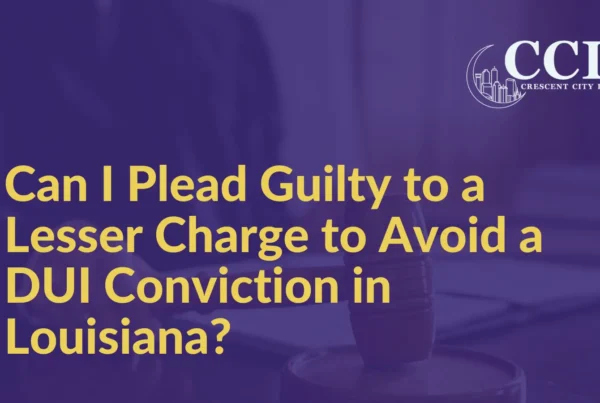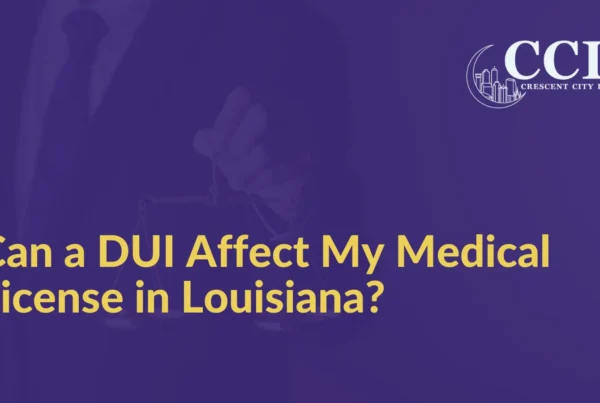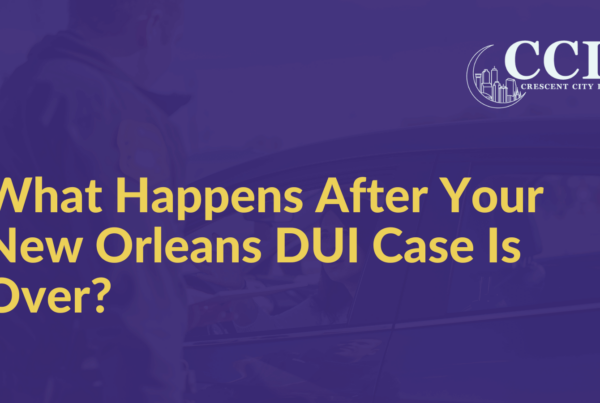When you are pulled over for driving under the influence of alcohol or drugs in New Orleans, the police officer will probably request that you take a field sobriety test. These tests are designed to accomplish two things: First, to determine if you are impaired and, second, to determine the level of your impairment.
Legal scholars will probably debate until the end of time about whether you should refuse a field sobriety test, but what’s my advice as a New Orleans DUI attorney with years of experience fighting DUI cases for my clients? My advice is to refuse these tests whenever you are asked to perform them. Here’s why.
What Does New Orleans Law Say About Sobriety Tests?
Under Louisiana law, a person can be arrested for driving under the influence (DUI), driving while intoxicated (DWI), or operating a vehicle while intoxicated (OVI) if:
- The person is under the influence of alcohol or drugs
- The driver’s blood alcohol concentration is 0.08 percent or more by weight (based on grams of alcohol per one hundred cubic centimeters of blood)
- The driver is under the influence of any controlled dangerous substance listed in Schedule I, II, III, IV, or V as set forth in R.S. 40:964, and/or
- The driver is under the influence of a combination of alcohol and one or more drugs that are not controlled dangerous substances and that are legally obtainable with or without a prescription.
To Take or Not to Take the Sobriety Field Test in New Orleans…
Sadly, in Louisiana, you can be arrested for DWI based on mere suspicion of intoxication. Your participation in, and likely failure of, a standardized field sobriety test (FSFT) only helps the cops prove their case.
It’s important to note that most people are not pulled over for DWI. Instead, they are stopped for things like speeding, swerving, or running a red light.
Up to the moment when you first encounter the police, they just think you’re speeding. When the cop realizes that you aren’t just in trouble for a traffic ticket, they engage in a series of standardized field sobriety tests as an attempt to gather evidence of your intoxication.
Here are some examples of field sobriety tests:
- The nystagmus test. This test is conducted to track the movement of your eyes from left to right (horizontal), then up and down (vertical). This test is used to determine a lot of different things: it can be used to determine if you’re suffering from a medical condition, whether you’re under the influence of drugs (but not alcohol), and it can determine your eyes’ ability to follow a light. To be honest, cops administer this test wrong all of the time!
- The walk-and-turn test. This test is designed to discover evidence about you and cops rarely make mistakes with it. First, the officer is testing your ability to listen, understand, and to follow a series of somewhat confusing directions. Even if you follow the directions, you’ll fail this test if you can’t stand up straight or walk in a straight line. The officer (and his video camera) is recording your every move. To be honest, this is a hard test to beat.
- A legged stand test. This test is designed to test your balance and your ability to follow directions like counting. I have tried this test sober and I fail every time.
- Any test that involves counting, spelling, or saying something by itself. These tests are hard for a reason: only drunk people who are trying to ‘beat’ the test with take it. Don’t try to beat the test.
I Was Arrested for DWI and I Submitted to a Field Sobriety Test … Does That Make Me Guilty?
No!
At Crescent City Law, we scour every DWI police report for mistakes that police make. Here are some examples we regularly see:
- Police are required to inform people they are under investigation as a suspected drunk driver. Police forget to inform people all the time.
- Defendants are not read their rights prior to questioning.
- Police are required to administer the standardized field sobriety test in conformity with the National Highway Safety Administration rulebook in order to ensure they receive accurate results.
- Police don’t administer the test properly.
Are There Penalties for Refusing a Field Sobriety Test in New Orleans?
No!
In the United States, you do not have an obligation to give law enforcement any evidence, including giving them evidence of intoxication through the performance of field sobriety tests.
However, there are increased penalties if you do not submit to a breathalyzer test when prompted.
When in Doubt, Invoke your Rights
It is awfully difficult to make a split-second decision to take or not to take a field sobriety test. In the vast majority of instances, it is best to refuse to participate because your lack of participation cannot be used against you at trial.
However, if you decide to participate in field sobriety tests, all is not lost. As noted above, our experienced DUI attorneys at Crescent City Law can challenge the validity of the tests.
Contact Crescent City Law Today
The best time to start fighting a DWI case is within the first 14 days of your arrest. Your right to drive with a valid license and many defenses to the charge could be lost if you wait too long. The attorneys at Crescent City Law are available to assist you. Call (504) 264-9492 to make an appointment now.






